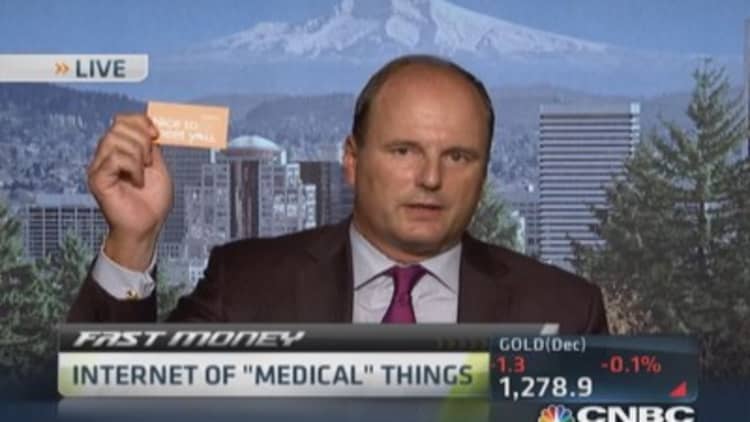Disruption in health care seems to have been a long time coming. From month-long wait times to preventable diseases; from inefficient IT systems to complicated medicines, the sector is now innovating, fast.
That's according to both clinicians and start-up founders at TechCrunch Disrupt in London, who argue that so-called healthtech is about to shake up the sector, making things better for both patients and doctors.
One obvious opportunity for the sector is the U.K.'s National Health Service (NHS), which is facing a funding gap of £30 billion ($48.4 billion) a year by 2021, according to the Nuffield Trust and NHS England.
"We have to look at new ways of delivering health care," NHS England's Tim Kelsey said at a Techcrunch Disrupt panel on "digital medicine".
"The role of technology is fundamental to the way we respond to this challenge," he added.
Read MoreElectronic Pills May Be the Future of Medicine
Dominic King, a surgeon and behavioral economist at Imperial College London, who was also speaking at the conference, highlighted the antiquated communication and IT services in the NHS as one area ripe for innovation.
"We still rely on desktop computers and pagers. The NHS has more functioning fax machines that the rest of industry in Britain put together," he said. "Digital health is the idea that we use mobile phones and tablet devices to make health care delivery more effective and cost effective."
Saving lives
And it goes beyond communication, with Kelsey highlighting that technology can help reduce the thousands of avoidable deaths recorded by the NHS each year: "It is quite genuinely about saving lives."
One key way of doing this is by tracking diseases digitally. Patients have been monitoring their blood pressure or blood-sugar levels at home for some time – now, this data can be automatically synced to smartphones and doctors' databases. Glooko, for instance, is an app which allows users with diabetes to download their blood glucose readings to their smartphones, and share it with their health care team.
It's not just small start-ups getting in on the act. Samsung and Apple are also offering health-tracking apps, with Apple Health allowing users to log and keep track of cholesterol readings, blood work data and more.
"There are dozens of companies who are trying to do things directly with the consumer - almost taking doctors out of the equation," King said. "They're offering apps which allow people to manage their diabetes without ever having to go to a hospital unless things go dramatically wrong."
Risky business?
Perhaps unsurprisingly, this has led to some concerns about the potential consequences of "taking doctors out of the equation".
Bleddyn Rees, head of health care at law firm Wragge Lawrence Graham, highlighted concerns about the accuracy of healthtech devices. Generally, even if you provide doctors with data collected from such a device, they will repeat the test.
Read MoreThe future of medicine means part human, part computer
"One of the reasons that health care systems ignore all bring-your-own devices is because they cannot be certain about the quality control," he said.
But the tech industry knows that it has to make consumer health care devices much more accurate and reliable, "such that the medical profession has faith in the data," Rees said, adding: "We're not there yet, but we're getting there massively quickly."
'Non-drug drug company'
Technology can also help with some psychological conditions, according to Peter Hames, co-founder of Sleepio. His company provides an online program that he says is clinically proven to help people sleep without pills. The key element of the 12-week plan – which costs $160 – is an online cognitive behavioural therapy (CBT) course.
Hames describes it as a "digital medicine program" – or, somewhat paradoxically, a "non-drug drug company" – which offers the health care sector a cheaper alternative to medication.

"We can take and track data to produce highly personalised behavioral medical programs. These are usually delivered by a person and are fundamentally unscalable and unstandardized," he said. "Our program mimics all the best qualities of drugs: it's scalable, affordable, evidence-based and standardized."
And for Hames it doesn't stop with insomnia. "From stress and anxiety, to depression – there's a huge array of areas we're looking at expanding into."
If apps like Sleepio take off, however, there is one consequence that might not be cheered by health care professionals: "Lots of doctors and nurses will unquestionably be put out of their jobs," King said.
Regulation barrier
There is one major issue that needs to be overcome before healthtech can take off in a big way, according to lawyer Rees: regulation. He described it as a "massive barrier" to innovation in the area.
"If you talk tech in health care, some people might be talking about telecoms, someone else might be talking IT and someone else might be talking about a medical device. That absolutely matters from a regulatory perspective," he said.
An item is considered a medical device if it is used for diagnosis or treatment, Rees said – and this poses problems for some developers looking to disrupt the health care industry.
"Failure to go through the regulatory approvals for a medical device is a criminal offence," he said. "And some people are jumping over that regulatory hurdle and may not even know that's the jump they made."
- By CNBC's Katrina Bishop



